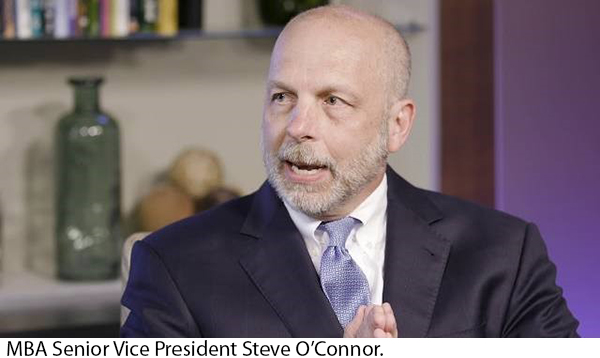
MBANow: MBA SVP Steve O’Connor on Basel III

The Mortgage Bankers Association released a new MBANow video featuring MBA Senior Vice President of Public Policy and Industry Relations Steve O’Connor, who discusses a decision by federal regulatory agencies to delay implementation of Basel III rules.
The video can be viewed at https://www.youtube.com/watch?v=_JHprqq0aqY&feature=em-uploademail.
The Federal Reserve Board, Office of the Comptroller of the Currency and the Federal Deposit Insurance Corp. issued a notice of proposed rulemaking that would pause Basel III implementation for certain assets, including mortgage servicing assets, for institutions with less than $250 billion in total consolidated assets and less than $10 billion in total foreign exposures.
O’Connor described the proposed delay as a “big win” for MBA and its members. He said the global policies set forth in Basel III should never have been applied to small financial institutions.
“The capital treatment of mortgage servicing assets and servicing rights in the Accord are particularly punitive to U.S. institutions and are having adverse consequences,” O’Connor said.
Mortgage servicing rights are in important asset that are unique to the U.S. mortgage market, O’Connor noted. “We think the treatment [of MSRs] is too punitive,” he said. “First of all, effective January 1 the risk weight goes from a hundred percent to two hundred fifty percent. But the bigger issue is the cap…the percentage of mortgage servicing assets that can count toward Tier 1 capital. What happens is once you hit this 10 percent cap, dollar-for-dollar you’ve got to deduct every dollar of servicing rights from your regulatory capital. So institutions either have to raise capital, sell servicing rights, curtail servicing or potentially exit.”
This is bad on a number of levels, O’Connor said. “First of all, it means the institutions are going to lose that relationship with the consumer if they have to sell the MSR,” he said. “Second of all, they’ll probably have to sell it at a discount, which will not only hurt them as an institution but it will depress MSR prices across the marketplace. We think it’s bad for consumers because if you have a depressed MSR market–and that’s what will happen if you’re taking buyers out of the market–it will mean higher rates for consumers. So we think at the end of the day it’s bad for the borrower after the institution that’s having to sell they’ll lose because of the arbitrary limit and it’s bad for the marketplace.”
O’Connor said MBA has been talking with regulators, urging them to hit the “pause” button. Now that they have a proposed pause in place, he said, MBA will continue to meet with regulators to develop a solution. “This is an opportunity to have a dialogue with our members, other stakeholders and with the regulators in trying to find a long-term solution,” he said.
Other videos in the MBANow series can be viewed at the MBA YouTube channel, https://www.youtube.com/watch?v=Swk2VUJeZFI&feature=em-uploademail. The videos are also available on the MBA Insights landing page, https://www.mba.org/publications/insights/insights-publication##SubscriberID####RND##&PageID=21109.
